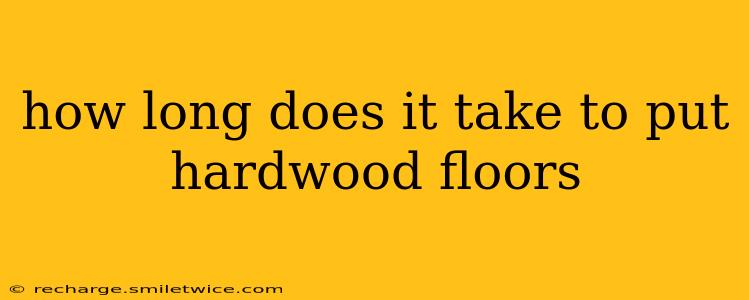How Long Does it Take to Install Hardwood Floors? A Comprehensive Guide
Installing hardwood floors is a significant home improvement project, and understanding the timeline is crucial for planning and budgeting. The total time required depends on several factors, making it impossible to give a single definitive answer. However, this guide will break down the process and the influencing factors, helping you estimate the installation time for your specific project.
What Factors Influence Hardwood Floor Installation Time?
Several key factors significantly impact the overall installation time:
- Size of the area: A larger space naturally takes longer to complete than a smaller one.
- Type of hardwood: Solid hardwood planks often require more time for installation compared to engineered wood. Solid wood needs more precise cuts and often requires acclimation time.
- Subfloor condition: A damaged or uneven subfloor requires extra time for repair and preparation before installation can begin. This is often a major unforeseen factor adding significant time to the project.
- Installation method: Nail-down installations generally take longer than glue-down or floating floor methods. The complexity of the method influences the total time.
- Skill level of installer: Experienced installers work more efficiently, completing the job faster than less experienced individuals.
- Complexity of the design: Intricate patterns or borders add considerably to the installation time.
- Accessibility: Difficult-to-reach areas or obstacles in the room can slow down the process.
How Long Does it Take for Professionals to Install Hardwood Floors?
Professional installers typically work at a consistent pace, which allows for more accurate time estimations. For a reasonably sized room with straightforward installation, a professional crew might take 2-5 days. This can vary based on the factors we've discussed above. Larger projects could easily take a week or even longer.
Remember: This timeline assumes a well-prepared subfloor and no major unexpected issues.
How Long Does it Take to Install Hardwood Floors Yourself?
DIY hardwood floor installation is an ambitious project requiring considerable time, patience, and skill. If you lack experience, it will undoubtedly take longer than a professional installation. Expect the process to take significantly longer, possibly several weekends or even more than a week, depending on your skill level and the size of the area. Factor in extra time for learning the process and making mistakes, which are inevitable when tackling this project without prior experience.
What Steps are Involved in Hardwood Floor Installation?
The entire process can be broken down into these main steps:
- Subfloor Preparation: This crucial step involves assessing and repairing any damage to the subfloor. This can easily take a day or more, especially if significant repairs are needed.
- Acclimation (for solid hardwood): Solid hardwood needs time to adjust to the humidity and temperature of the room before installation. This process can take several days.
- Installation: This is the main part of the process where the flooring is laid according to the chosen method.
- Finishing: This step includes sanding, staining, and sealing the floor, adding significant time to the total project length.
How Long Does it Take to Dry After Installation?
The drying time depends on the type of finish and the environmental conditions. A water-based polyurethane finish typically needs at least 24 hours to dry before light foot traffic and several days for heavy traffic. Oil-based finishes require even more drying time. Always follow the manufacturer's instructions carefully.
Can I Speed Up the Hardwood Floor Installation Process?
While you can’t drastically shorten the time, careful planning can help:
- Hire Professionals: Experienced installers can complete the job efficiently and effectively, often saving time in the long run.
- Prepare the Subfloor Thoroughly: Addressing any subfloor issues before the installation begins will prevent delays.
- Choose the Right Flooring: Engineered wood can sometimes be faster to install than solid hardwood.
- Organize your Materials: Having everything you need readily available will streamline the process.
In conclusion, the time required to install hardwood floors is highly variable. By understanding the influencing factors and breaking the process down into its individual steps, you can create a more realistic timeline for your project, whether you're hiring professionals or tackling it yourself. Remember to always factor in potential delays and unexpected issues.
